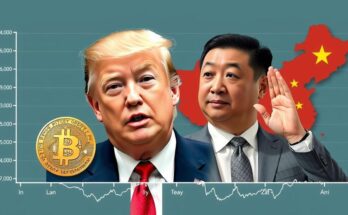President-elect Donald Trump’s proposed tariffs on imports from China could result in significant price increases for tabletop games, triggering alarm within the industry. While intended to bolster domestic manufacturing, these tariffs threaten to harm American consumers and game designers. Industry leaders express concerns over affordability and business viability, highlighting the challenging economic landscape they may have to navigate if these tariffs are implemented.
The tabletop gaming industry faces significant challenges due to President-elect Donald Trump’s proposed tariffs on imported goods, particularly from China. These tariffs, which could reach a universal increase of up to 20% and targeted increases of 60-100% on Chinese imports, threaten to substantially inflate costs for consumers and game designers alike. This development has caused widespread apprehension among industry players, as many tabletop games rely on Chinese manufacturing for components such as books, miniatures, and dice. Industry groups, including the Consumer Technology Association (CTA), warn that such tariffs will negatively impact the American economy by raising prices for consumers and jeopardizing jobs. The CTA’s report states, “the tariffs, if enacted, will only harm American consumers, households, workers, businesses, organizations, and governments at all levels.” Although these tariffs are intended to promote domestic manufacturing, experts assert that a complete reshoring of industry is impractical due to the lack of supporting infrastructure in the U.S. Individual tabletop creators have begun to feel the potential ramifications of these tariffs on their businesses. Meredith Placko, CEO of Steve Jackson Games, has expressed her concerns, indicating, “I have been talking at length with my factory representatives, figuring out how much of an item I need to order now to offset any expanded costs later.” Similarly, British board game developer Judson Cowan highlighted the potential financial burden stating, if tariffs are enacted, “it may potentially affect my ability to sell games in the US in the future.” As the transition of power occurs and the new administration prepares to take office, the future of these proposed tariffs remains uncertain. This period of flux complicates the less predictable landscape for the tabletop game industry and heightens concerns for creators depending on affordability and international supply chains.
The proposed tariffs by President-elect Donald Trump represent a pivotal shift in U.S. trade policy, particularly affecting industries relying on imported goods. Notably, the tabletop gaming sector, which often depends on Chinese manufacturing for essential components, stands to face considerable operational challenges should these tariffs be enacted. The landscape of international trade, coupled with the existing dynamics of the U.S. economy, creates a complex backdrop for understanding the potential impact on game producers and consumers alike, further intensified by the political climate during the transition of leadership.
In conclusion, the proposed tariffs by President-elect Donald Trump pose grave risks to the tabletop gaming industry through heightened costs and potential job losses. The reliance on foreign manufacturing, especially from China, means that both consumers and creators may face prohibitively expensive products if these tariffs take effect. As the sector navigates this uncertainty, the voices of industry leaders emphasize the pressing need for clarity on future trade policies to secure the viability of tabletop gaming in America.
Original Source: www.polygon.com




